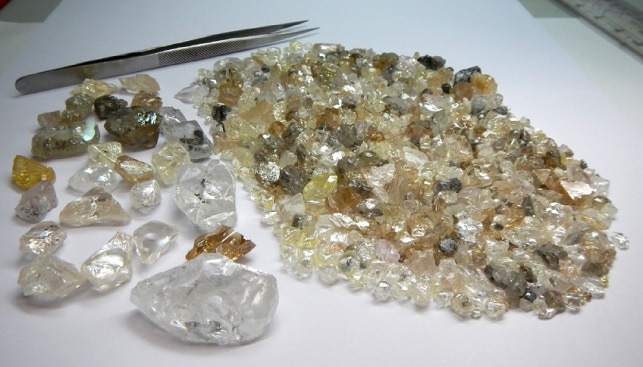The Future of Mining: A Look at Wigmore Trading’s Role in Shaping Lead, Zinc, and Tin Production in Nigeria
The Future of Mining: A Look at Wigmore Trading’s Role in Shaping Lead, Zinc, and Tin Production in Nigeria
Mining has always been a crucial industry in Nigeria, but with the rise of technology and innovation, its future is looking brighter than ever. In this blog post, we will explore how Wigmore Trading is revolutionizing lead, zinc, and tin production in the country. Get ready to dive into the exciting world of mining and see just how this company is shaping the future of this vital sector. Let’s dig in!
Introduction to the Mining Industry in Nigeria
The mining industry in Nigeria has played a significant role in the country’s economic development, contributing to its overall growth and diversification. With an abundance of mineral resources, Nigeria is one of the leading producers of lead, zinc, and tin in Africa.
Nigeria’s mining sector dates back to the colonial era when British companies started exploiting the country’s mineral deposits. However, it was not until the 1960s that Nigeria began to fully tap into its mining potential with the establishment of the Nigerian Coal Corporation (NCC) and Nigerian Mining Corporation (NMC). Since then, there has been a steady growth in mineral production in Nigeria.
One of the major minerals produced by Nigeria is lead ore. The country possesses large deposits of this valuable metal which is primarily used for making batteries for automobiles and other industrial applications. According to data from the Nigerian Geological Survey Agency (NGSA), Nigeria has an estimated reserve of over 10 million metric tons of lead ore.
Another vital mineral resource found in abundance in Nigeria is zinc ore. This metal is essential for galvanizing steel and as a component in various alloys used for construction and manufacturing purposes. With an estimated reserve of about 2 million metric tons, Nigeria ranks among the top producers of zinc ore globally.
Tin ore is another critical mineral found in large quantities in Nigeria. It is commonly used as a coating material on food packaging cans due to its non-toxic nature. Tin ore also has various industrial applications such as being used as an alloy with copper to produce bronze. According to NGSA data, Nigeria has over 80 million metric tons of tin reserves.
Wigmore Trading Limited has been at the forefront of shaping lead, zinc, and tin production in Nigeria since its inception over two decades ago. As one of the leading exporters and suppliers of these minerals, Wigmore Trading plays a crucial role not only in generating revenue for both local miners but also contributing to the overall growth and development of Nigeria’s mining sector.
The future of mining in Nigeria is bright, with continued efforts by both the government and private sector players like Wigmore Trading to increase production levels and explore new mineral deposits. With proper management and harnessing of these valuable resources, the mining industry in Nigeria has the potential to drive economic growth and reduce dependence on oil exports. In the coming years, we can expect to see significant developments in this sector, making it a vital contributor to Nigeria’s economy.
History of Lead, Zinc, and Tin Production in Nigeria
The history of lead, zinc, and tin production in Nigeria dates back to ancient times. These three metals have played a significant role in the economic development and growth of the country, with their mining and production being an important source of revenue for the government.
Lead was first discovered in Nigeria in 1905 by a team of British geologists. The mineral was found in large quantities in Enugu, Benue, Ebonyi, and Nasarawa states. This discovery led to the establishment of small-scale mining operations which gradually expanded as demand for lead increased globally during World War I and II.
In the late 1960s, Nigeria became one of the leading producers of lead in Africa and ranked amongst the top ten producers worldwide. However, due to political instability and mismanagement, production declined significantly in the 1970s.
Zinc was also discovered around the same time as lead but remained largely unexploited until the mid-1950s when large deposits were found in Jos Plateau. The Nigerian Zinc Corporation (NIZCO) was established to take advantage of these reserves and became one of the major players in zinc production before its privatization in 1992.
Tin mining has been ongoing since pre-colonial times and is believed to be one of the oldest industries in Nigeria. The famous “Jos Tin” is known for its high quality and has been exported all over the world since its discovery by British colonizers. At its peak, Nigeria was one of the world’s largest producers of tin ore.
However, with fluctuating prices on international markets coupled with inefficient mining practices and lack of investment, tin production has dwindled significantly over time.
In recent years, there has been a renewed interest in lead, zinc, and tin production as global demand for these metals continues to rise. The Nigerian government has implemented policies aimed at encouraging local miners to increase their output while attracting foreign investors to revitalize the industry.
Wigmore Trading, a leading mining company in Nigeria, has been at the forefront of this revitalization effort. The company has invested in modern technology and equipment to improve efficiency and safety in its operations. It also provides training and support for local miners to enhance their skills and productivity.
While lead, zinc, and tin production in Nigeria have had a tumultuous history, there is immense potential for growth and development in these industries. With the right investments and policies in place, Wigmore Trading is confident that it can play a significant role in shaping the future of mining in Nigeria.
The Current State of Mining in Nigeria
The mining industry in Nigeria has been a crucial source of economic development for the country, providing employment opportunities and contributing to the national GDP. However, over the years, there have been significant challenges faced by the sector that have hindered its growth and potential.
One of the major issues plaguing the mining industry in Nigeria is inadequate infrastructure. The lack of proper roads, rail networks, and ports makes it difficult for companies to transport equipment and materials needed for mining operations. This not only increases costs but also delays production timelines.
Another factor that has affected the state of mining in Nigeria is political instability. Frequent changes in government policies and regulations create uncertainty for investors, making it challenging to plan long-term projects. Corruption is also a prevalent issue in the country’s mining sector, leading to illegal activities such as smuggling and fraudulent transactions.
Furthermore, Nigeria’s current tax laws are not favorable for mining companies. The high tax rates imposed on businesses make it less attractive for foreign investors who may choose to invest elsewhere with more favorable tax regimes.
Moreover, environmental concerns have also impacted the state of mining in Nigeria. With inadequate regulations and enforcement measures, many companies do not adhere to proper waste management practices or take necessary precautions to minimize their environmental impact.
Despite these challenges, there have been efforts made by both the government and private sector players to improve the state of mining in Nigeria. The Nigerian Mining Corporation (NMC) was established in 1972 as a statutory corporation responsible for regulating all aspects of mineral exploration throughout the country. In recent years, there have also been policy reforms aimed at streamlining procedures and reducing bottlenecks faced by investors.
Additionally
Wigmore Trading: A Key Player in Nigerian Mining
Wigmore Trading is a leading player in the Nigerian mining industry, with a strong reputation for its role in shaping the production of lead, zinc, and tin. Founded in 2005, Wigmore Trading has emerged as one of the most innovative and dynamic companies in Nigeria’s mining sector.
The company’s commitment to excellence and sustainability has enabled it to become a key contributor to the growth and development of Nigeria’s mineral resources. With a team of dedicated professionals who possess extensive knowledge and experience in the mining industry, Wigmore Trading has been at the forefront of driving significant changes in how lead, zinc, and tin are produced in Nigeria.
One of Wigmore Trading’s key contributions to the Nigerian mining sector is its focus on promoting sustainable practices. The company recognizes that responsible management of natural resources is crucial for long-term success, not only for itself but also for the country as a whole. As such, it has implemented various measures to ensure that its operations do not negatively impact the environment or local communities.
In addition to promoting sustainability, Wigmore Trading has also placed great emphasis on technology advancements within the mining sector. The company understands that technological innovations play a critical role in improving efficiency and productivity while reducing operational costs. Therefore, it consistently invests in advanced technologies and equipment to enhance its operations’ efficiency while maintaining high safety standards.
Furthermore, Wigmore Trading actively engages with local communities near its mines by providing employment opportunities and supporting community initiatives such as education programs and healthcare services. This approach has not only helped build strong relationships with these communities but also contributed significantly to their socio-economic development.
As part of its commitment to being an industry leader, Wigmore Trading continuously implements best practices across all aspects of its operations. This includes utilizing modern exploration techniques to identify new deposits efficiently and implementing efficient extraction methods that minimize waste generation. By doing so, it ensures optimal resource utilization while minimizing environmental impacts.
Through these efforts, Wigmore Trading has become a key player in the production of lead, zinc, and tin in Nigeria. Its dedication to sustainable practices, technological advancements, and community involvement have set it apart as an exemplary leader in the country’s mining industry.
Wigmore Trading’s role in shaping the future of mining in Nigeria cannot be overstated. The company’s commitment to excellence and responsible management of resources has enabled it to contribute significantly to the growth and development of the Nigerian economy while safeguarding its natural resources for future generations.
Impact of Wigmore Trading on Lead, Zinc, and Tin Production
Wigmore Trading, a leading mining and trading company in Nigeria, has played a significant role in shaping the production of lead, zinc, and tin in the country. With its advanced technology, sustainable practices, and strong partnerships with local communities and government institutions, Wigmore Trading has made a positive impact on the mining industry.
One of the biggest impacts of Wigmore Trading on lead production is its focus on responsible mining practices. The company adheres to strict environmental regulations and invests in technologies that reduce carbon emissions and minimize waste. This has not only helped improve the quality of lead produced but also reduced the negative impact on the environment.
Furthermore, Wigmore Trading’s efficient extraction techniques have greatly increased the production of lead in Nigeria. By implementing modern methods such as underground mining and using state-of-the-art equipment, the company has been able to extract more lead from mines while minimizing costs.
In addition to lead production, Wigmore Trading has also greatly influenced zinc production in Nigeria. Through its investments in research and development, the company has developed new techniques for extracting zinc from ores at lower costs. This has led to an increase in zinc production which not only benefits Wigmore Trading but also boosts Nigeria’s economy.
Moreover, Wigmore Trading’s commitment to sustainability extends to tin production as well. The company recognizes that tin is a finite resource and therefore focuses on conserving it through recycling initiatives. By promoting circular economy principles within its operations, Wigmore Trading ensures that tin resources are conserved for future generations.
The impact of Wigmore Trading goes beyond just increasing production levels; it also brings socio-economic benefits to local communities where its mines are located. The company works closely with these communities by providing employment opportunities and supporting local businesses. It also invests in community development projects such as education and healthcare facilities.
Additionally, through partnerships with local governments, Wigmore Trading contributes significantly to Nigeria’s economy through taxes and royalties paid on its mining activities. This revenue is then used to fund infrastructure development and social welfare programs, ultimately benefiting the entire nation.
Wigmore Trading has made a significant impact on lead, zinc, and tin production in Nigeria by implementing sustainable practices, utilizing advanced technology, and promoting community development. As the company continues to grow and expand its operations, it is expected that its positive influence on the mining industry will only continue to increase.
Future Plans and Innovations for Sustainable Mining Practices
The mining industry has a significant impact on the environment, and as global concerns over sustainability continue to rise, it is crucial for mining companies to adopt sustainable practices in their operations. Wigmore Trading recognizes this responsibility and is committed to continuously improving its mining practices for lead, zinc, and tin production in Nigeria.
In line with this commitment, Wigmore Trading has implemented various measures aimed at reducing its environmental footprint and promoting sustainable development. These initiatives include investing in innovative technologies that minimize waste generation and reducing energy consumption through the use of renewable energy sources.
One of the key future plans for sustainable mining practices at Wigmore Trading is the implementation of a closed-loop system. This approach involves minimizing waste by recycling or repurposing materials within the mining process. By utilizing this circular economy model, Wigmore Trading aims to reduce its environmental impact while also creating value from previously discarded materials.
Another innovative solution being explored by Wigmore Trading is the use of autonomous vehicles in their mines. These self-driving trucks are equipped with advanced technology that can navigate challenging terrain and operate efficiently without human intervention. This not only increases safety for workers but also reduces fuel consumption and carbon emissions.
Additionally, Wigmore Trading is exploring ways to incorporate renewable energy into their operations through solar power installations at their mine sites. This move towards clean energy not only reduces greenhouse gas emissions but also helps mitigate operational costs associated with traditional forms of power generation.
Apart from technological advancements, Wigmore Trading also recognizes the importance of stakeholder engagement in promoting sustainable mining practices. The company regularly collaborates with local communities and government agencies to ensure responsible resource extraction and promote economic development in affected areas.
Moreover, education and training programs are being developed for employees to raise awareness about sustainable practices such as responsible water usage, reforestation efforts, and proper waste management techniques.
Wigmore Trading understands that sustainability is vital for the long-term success of both their business operations and the environment. The company is committed to investing in innovative solutions and engaging stakeholders to promote sustainable mining practices for lead, zinc, and tin production in Nigeria. By continuously striving for improvement, Wigmore Trading is playing a crucial role in shaping the future of mining towards a more sustainable direction.
Challenges and Opportunities in the Nigerian Mining Industry
Challenges and Opportunities in the Nigerian Mining Industry:
The Nigerian mining industry has faced several challenges in recent years, hindering its development and growth potential. These challenges include inadequate infrastructure, political instability, limited funding, and inconsistent policies. However, despite these obstacles, there are also significant opportunities for the industry to thrive and contribute to the country’s economic growth.
One of the major challenges facing the Nigerian mining industry is inadequate infrastructure. The lack of proper road networks, rail systems, and reliable power supply makes it difficult to transport equipment and minerals from remote mining sites to processing plants or export ports. This not only increases production costs but also hinders potential investments in the sector.
Political instability is another challenge that has affected the growth of the Nigerian mining industry. Frequent changes in government policies have created an uncertain business environment for investors. This has led to a lack of trust and confidence in the sector, which is crucial for attracting foreign investment.
Limited funding is also a significant challenge facing the Nigerian mining industry. Despite having vast mineral resources, many local miners struggle to access financing from banks or other financial institutions due to high-interest rates and strict lending criteria. As a result, they are unable to invest in modern technology or expand their operations.
Inconsistent policies are another obstacle hindering the growth of Nigeria’s mining sector. The frequent changes in laws and regulations make it challenging for companies to plan long-term investments or attract international partners who may be wary of investing in an uncertain regulatory environment.
However, amidst these challenges lie numerous opportunities for growth and development within Nigeria’s mining industry. One such opportunity is its vast untapped mineral resources; Nigeria boasts significant deposits of lead, zinc, tin as well as gold, iron ore, coal among others. With proper exploration and exploitation efforts coupled with supportive government policies on licensing and regulation can unlock immense potential within this sector.
Moreover,Wigmore Trading’s involvement in shaping lead,zinc,and tin production in Nigeria also presents an opportunity for the industry. By providing technical support and expertise, Wigmore Trading can contribute to the development of modern mining techniques and technologies in Nigeria, leading to increased efficiency and productivity.
While the Nigerian mining industry may face several challenges, there are also significant opportunities for growth and development. Addressing these obstacles will require a collaborative effort between the government, private sector players like Wigmore Trading, and other stakeholders to create a conducive environment that promotes sustainable mining practices and attracts foreign investment.
Conclusion: The Promising Future of Mining with Wigmore Trading
It is evident that Wigmore Trading plays a crucial role in shaping the future of lead, zinc, and tin production in Nigeria. Through their commitment to sustainable mining practices and investment in modern technologies, they have been able to revolutionize the mining industry in the country.
Wigmore Trading’s emphasis on responsible mining has not only improved the environmental impact of their operations but also ensured the safety and well-being of their workers. This approach has also gained them recognition and trust from local communities, government agencies, and international organizations.
Moreover, their focus on continuous improvement through research and development has resulted in increased efficiency and productivity. With the implementation of advanced machinery and techniques such as drone mapping, data analysis, and automation, Wigmore Trading has been able to reduce operational costs while increasing output. This not only benefits the company but also contributes to the economic growth of Nigeria.
Furthermore, Wigmore Trading’s partnership with local miners has created employment opportunities for many Nigerians. By providing training programs for locals on safe mining practices and equipping them with necessary skills, Wigmore Trading is empowering individuals to actively participate in the mining sector and improve their livelihoods.
The company’s commitment towards sustainability is also reflected in its efforts towards reclamation of mined lands. They have implemented innovative techniques such as land rehabilitation using organic fertilizers to restore ecosystems affected by mining activities. This not only ensures that these lands remain fertile for future use but also showcases Wigmore Trading’s dedication towards responsible stewardship of natural resources.
It is clear that Wigmore Trading is leading the way for a promising future for mining in Nigeria. Their ethical business practices combined with modern technology have set a precedent for other companies operating in this sector. Through their efforts, we can expect continued growth and development in lead,zinc,and tin production while preserving our environment for generations to come.
As we move towards a more sustainable world, it is essential for companies like Wigmore Trading to continue their commitment towards responsible mining practices. With their strong moral values and dedication to innovation, we can be confident that the future of mining in Nigeria is in good hands.








Comments are closed.